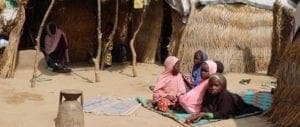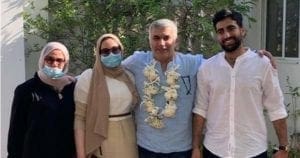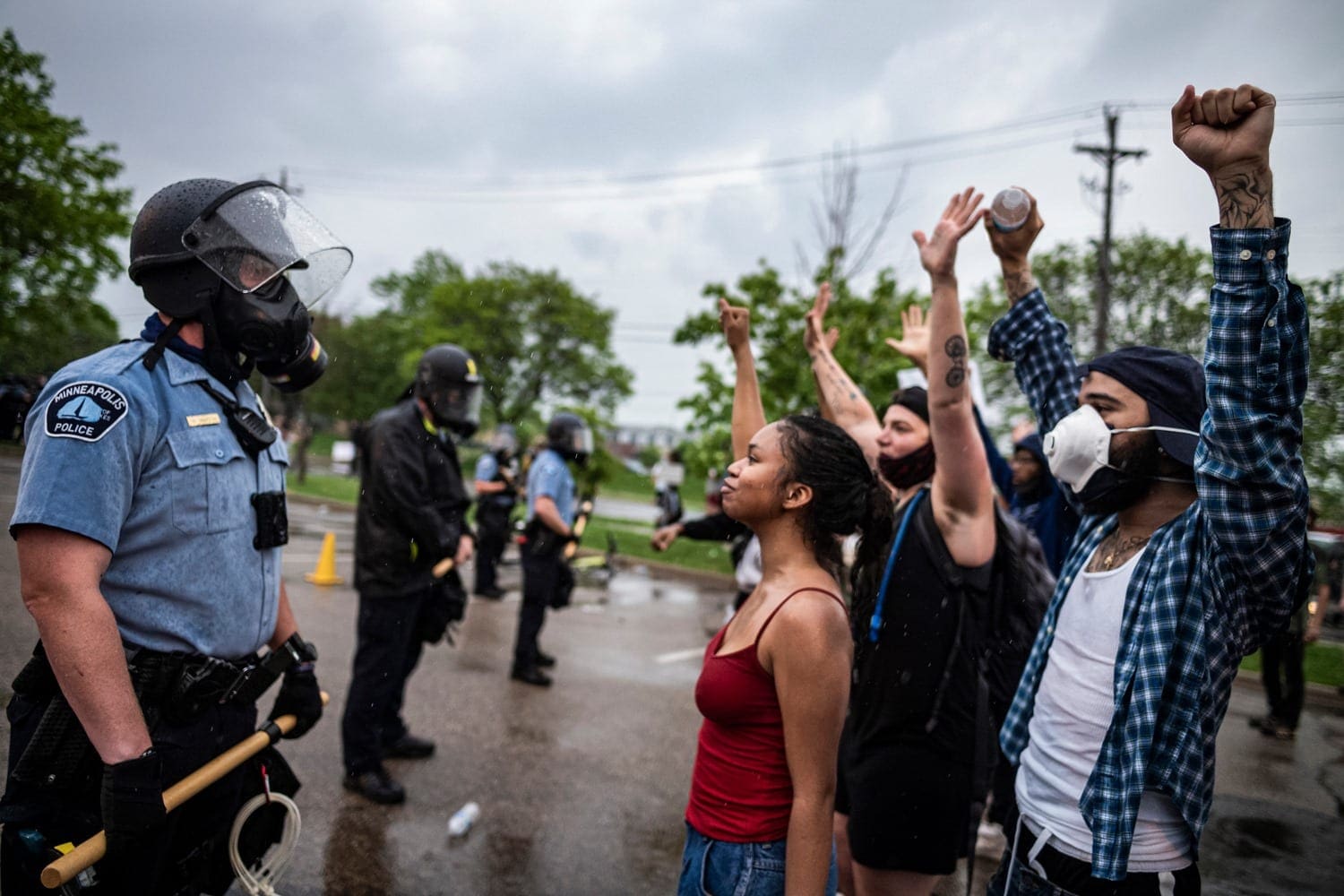JULY 2020 NEWSLETTER
FEATURED ISSUE
Unlawful Police Violence & Misuse of Tear Gas Against Protesters
WIDESPREAD POLICE VIOLENCE AGAINST PROTESTERS FOR BLACK LIVES
June, Amnesty International published a new interactive map documenting 125 separate examples of police violence against protesters in 40 states and the District of Columbia between May 26 and June 5, 2020, a period when hundreds of thousands of people protested against racism and police violence. The analysis shows that law enforcement consistently violated human rights instead of fulfilling their obligations to respect and facilitate the right of people to peacefully protest. Those abuses were committed by a range of security forces from state and local police departments, federal agencies, and the National Guard. On June 3 Amnesty International USA sent a letter to the Senate Homeland Security, Judiciary, and Energy and Natural Resources Committees urging them to investigate the use of unlawful force on peaceful protesters in Washington, D.C.
Amnesty supports the bipartisan George Floyd Justice in Policing Act (H.R. 7120) which was passed by the House in June. Amnesty urges the Senate to swiftly pass the bill in July. Americans of all races and party affiliation are raising their voices loud and clear: NOW is the time for Congress to pass critical legislation to end police killings of Black people, end impunity, and transform policing.
Growing Misuse of Tear Gas Against Protesters

In June, Amnesty International published Tear Gas: An Investigation, an interactive, multimedia site documenting scores of cases of tear gas misuse by security forces worldwide, often resulting in severe injuries or death. Using open source investigation methods, Amnesty International’s Digital Verification Corps verified close to 500 videos and highlighted almost 80 events in 22 countries and territories where tear gas has been misused. The tear gas investigation site includes video interviews with experts in policing, business, and human rights.
Facial Recognition Policy Ban
The use of facial recognition technology (FRT) for mass surveillance exacerbates human rights violations by police in their targeting of Black communities. First, systems process some faces less accurately than others, with higher false positive rates for women and African Americans. Improving accuracy rates for already marginalized or disadvantaged groups does not address the second problem with FRT – namely that “improving” accuracy may only amount to increasing surveillance and disempowerment of already disadvantaged and over-surveilled communities. Further, the indiscriminate collection and monitoring of facial recognition data without individualized reasonable suspicion of criminal wrongdoing has a chilling effect on the right to peaceful assembly. Congress should ban the use of FRT for mass surveillance purposes by the police and other agencies.
COVID-19 & HUMAN RIGHTS
Congress Must Pass the Protecting Human Rights in Pandemic Act
On June 9 Amnesty International USA joined 12 other organizations in a letter to the Senate Foreign Relations Committee urging swift passage of the Protecting Human Rights During Pandemic Act (S. 3819/ H.R. 6936). Congress should swiftly pass this bipartisan, bicameral legislation to stop governments from using the COVID-19 pandemic as a pretext for abusive emergency power grabs.
International Covid-19 Response failing refugees and Migrants

In May, Amnesty released a public statement on how refugees and migrants have been forgotten in COVID-19 responses worldwide. The inhumane treatment of refugees and migrants threatens to stall progress on the global fight against COVID-19. Around the world, lockdowns and movement restrictions have exacerbated dire living conditions for refugees and displaced populations, leaving millions of people at risk of starvation and illness. In many camps, death by starvation is now reported to be a bigger threat than the virus itself. Here’s Amnesty’s special feature on the risks that Rohingya refugees face in light of COVID-19.
U.S. Immigration Detention
Amnesty joined a coalition of nearly 30 organizations to deliver over 50,000 petitions to ICE and DHS, and over 4,000 petitions to the governors of California, Louisiana, New Jersey, Pennsylvania, Texas and Washington to press ICE to release immigrants and asylum-seekers detained in their states. Federal authorities have refused to use their discretion to release detainees including families, violating human rights and imperiling public health. Congress should press Acting Director Albence and other senior DHS officials to release detainees and should pass the Federal Immigration Release for Safety and Security Together (FIRST) Act (H.R. 6537, S. 3645), which would release at-risk detainees and establish a presumption of release for all detainees.
Protecting Guantanamo Bay Detainees During COVID-19 Pandemic
Amnesty supports Senator Warren’s letter, joined by more than a dozen Senators, asking Defense Secretary Esper to share publicly plans for protecting detainees and military personnel at the Guantanamo Bay Detention Center during the COVID-19 pandemic. Amnesty also urges Congress to lift restrictions on transferring detainees to the U.S. for necessary medical treatment.
El Salvador
The COVID-19 situation has exposed how the Bukele administration has imposed repressive and abusive tactics, including detaining more than 2,000 people for allegedly violating home quarantine orders and locking them in “containment centers” that do not comply with minimum standards for sanitary conditions and physical distancing.
#FreeKelly from ICE Detention in Aurora, Colorado
Kelly Gonzalez Aguilar recently turned 24 – her third birthday behind bars. Kelly is a transgender woman who fled Honduras when she was 12 because of violence against her based on her transgender identity. She arrived in the U.S. seeking safety and has been needlessly locked up by immigration authorities since August 2017 for over 1,000 days as she awaits the results of her asylum claim. She’s currently in the Aurora ICE Detention Facility in Colorado, where there have been at least 14 COVID-19 cases. Her attorneys filed a habeas, arguing the medical risks she faces in detention, in light of COVID-19 and ICE’s failure to provide adequate safeguards, violate her constitutional rights.
AIUSA received reports from organizations that ICE used hazardous sprays to allegedly decontaminate the Aurora facility, where detainees including Kelly reported rashes and nosebleeds from the chemicals and inadequate healthcare in response. Amnesty International, TransLatin@ Coalition, and National Immigrant Justice Center ask Congress to write and urge ICE to release Kelly on humanitarian parole instead of fighting the habeas.
International Updates
ASIA
HONG KONG

June was a devastating month for human rights in Hong Kong, with the passage of two major laws that threaten free expression and human rights. In early June, Hong Kong’s Legislative Council passed a law that makes it illegal to insult China’s national anthem. The national anthem law makes “insulting” or “misusing” the Chinese national anthem a crime punishable by a fine of up to US$6400 and a maximum penalty of three years’ imprisonment. Since 2015 there have been several incidents of Hong Kong football fans booing or turning their backs when the Chinese national anthem is played at games. Such behavior is now a criminal offense under the new law. International human rights standards make clear that peaceful criticism of, or insult to, a nation or its symbols does not constitute a threat to national security or justify prohibition on other grounds.
Further, in late June, China passed a national security law (NSL) with a definition of ‘national security’ so vague that it’s near impossible to know how and when anyone might violate it. Amnesty International had joined 86 civil society organizations calling on Chinese authorities to scrap the proposed national security law for Hong Kong. The NSL provides for secret trials and allows China’s security agencies to freely operate in Hong Kong. Under the NSL, the crimes of separatism, subversion, terrorism and collusion with foreign or external forces are punishable by a minimum sentence of three years and a maximum of life imprisonment. The Chinese central government will establish an Office of Safeguarding National Security in Hong Kong with its own law enforcement personnel and the ability to exercise jurisdiction over certain cases. This will allow suspects to be transferred for detention and trial to China, where individuals accused of endangering national security are routinely denied fair trial rights.
CHINA
On June 12, Zoom revealed that it had suspended the accounts of human rights activists at the request of the Chinese government and suggested it will block any further meetings that Beijing says are “illegal”. It also admitted that it ended three out of four meetings on the Tiananmen crackdown. The accounts have since been reinstated after Zoom acknowledged it had made a mistake and that its response “should not have impacted users outside of mainland China”. Tech firms such as Zoom must put principles before profit and defend internet freedom, rather than bowing to repressive governments’ demands to stifle it.
Philippines
On July 3 Philippine President Duterte signed into law the Anti-Terrorism Act of 2020 which replaces the Human Security Act of 2007. The law allows the police or military to detain suspects without a judicial warrant of arrest for 14 days which can be extended by 10 more days. The law also allows the police or military to place suspects under surveillance for 60 days which can be extended by up to 30 days. This law grants the government excessive and unchecked powers and is the latest example of the Philippines’ deteriorating human rights record. Amnesty has called upon the United Nations to launch a formal investigation into the ongoing widespread and systematic human rights violations in the Philippines.
Sub-Saharan Africa
Nigeria

Amnesty released a May report that documents the experience of children during the ongoing conflict between Boko Haram and the Nigerian military. The report, ‘We dried our tears’: Addressing the toll on children of Northeast Nigeria’s conflict, examines how the military’s widespread unlawful detention and torture have compounded the suffering of children suffered war crimes and crimes against humanity at the hands of Boko Haram.
The Nigerian government should conduct a full, transparent, and independent investigation, led by civilian judicial authorities, into the deaths in custody that have occurred at the Operations Safe Corridor facility outside Gombe. Congress should condition support for the Operations Safe Corridor program on guarantees and tangible progress by the Nigerian authorities in immediately releasing detained children.
Middle East and North Africa
Libya
Amnesty welcomes the establishment of the fact-finding mission as an important and long overdue step towards ending the rampant impunity that has for years fueled the horrific crimes committed in Libya. Amnesty and many Libyan and international organizations have been working towards the establishment of an international investigative mechanism for years. Congress should pass the bipartisan Libya Stabilization Act (H.R. 4644, S. 2934) to help bring relief to those suffering in Libya.
Egypt
Since 2016 the Egyptian authorities have consolidated their grip on the media landscape and intensified their crackdown on journalists daring to critique the government’s official narrative, according to a May 2020 Amnesty International report. This clampdown on media not only violates journalists’ right to freedom of expression but also the general public’s access to independent information. How has the U.S. responded? By selling more emergency arms to Egypt. Amnesty International calls on Congress to cease arms sales to Egypt unless and until authorities halt the crackdown on journalists.
Lebanon
Lebanon is home to more than 250,000 migrant domestic workers, mostly women, who come from African and Asian countries and work in private households. Despite several years of campaigning by human rights organizations and activists to end the kafala system and extend labor protections to domestic workers, past Lebanese governments have failed to meaningfully address these abuses or to provide effective remedy to victims of the system. Amnesty International recently documented cases where migrant domestic workers have been abandoned by their employers due to the intensifying economic crisis, without pay, their belongings, or passports. Amnesty International USA is calling for the US Government to pressure Lebanon to end its abusive kafala system.
Syria
Amnesty International has updated a newly released report on the atrocities committed during the civil war in Syria which has killed almost half a million people. Our report “Nowhere is Safe for Us: Unlawful Attacks and Mass Displacement in North-West Syria” documents unlawful attacks and mass displacement in the country, particularly in rebel held areas.
Individuals at Risk
Colombia
On July 6, 2020, 94 Members of Congress sent a letter to Secretary of State Pompeo denouncing the shocking number of human rights defenders killed in Colombia. The Dear Colleague letter lead by Congressman McGovern and Pocan, outlined the need to protect human rights defenders, who are being killed at higher rates than anywhere else in the world. In 2019, 106 of the 304 HRDs killed globally were from Colombia. 2020 is going to be a record year with over 121 human rights defenders killed in Colombia so far. Amnesty calls on the US Congress to continue pressuring the Colombian government to protect human rights defenders, publicly recognize the importance of their work, and hold those responsible who threaten and attack HRDs.
Turkey
On July 3 four human rights defenders, including Amnesty Turkey’s former Board Chair Taner Kilic and Amnesty Turkey’s former Director Idil Eser, were convicted in Turkey on baseless politically motivated terrorism charges. For the past three years, eleven human rights defenders in Turkey have been fighting numerous spurious legal charges, which could carry up to 15 years in prison. On Friday, Taner Kilic was sentenced to 6 years and 3 months in prison for membership in a terrorist organization, and Idil Eser, Ozlem Dalkıran, and Gunal Kursan were all given 25 months for assisting a terrorist organization, despite there being no evidence to substantiate these ridiculous claims. On December 5, 2017, the Tom Lantos Human Rights Commission sent a letter calling for the charges against these 11 human rights defenders to be dropped and that they be immediately and unconditionally released. Amnesty International is calling again on the US Congress to denounce, in the strongest terms possible, this conviction of these 4 human rights defenders, and that all charges against them be dropped.
Gender
Congress should pass the Keep Women and Girls Safe From the Start Act (H.R. 4092, S. 4003)
In humanitarian situations, women and girls face an increased risk of rape, child marriage, domestic violence, human trafficking, exploitation by humanitarian personnel, and other forms of gender-based violence (GBV). This legislation would implement the Safe from the Start program that would ensure context-appropriate services for girls and women who are exposed to GBV during humanitarian crises, and establish tools to promote greater efficiency and accountability of response and recovery efforts.
International Criminal Court
Attacks on the ICC Endanger NGO Workers
Amnesty condemns the June 11 White House announcement of a raft of punitive measures against International Criminal Court (“ICC”) officials, staff, and their family members. The Trump Administration’s new round of sanctions targeting the ICC have been slammed by major U.S. allies. In comments to the Washington Post, CNN, and Voice of America, Amnesty urged the White House to support and improve multilateral organizations, rather than destroy them. Amnesty joins dozens of other international organizations in urging Congress to publicly oppose the White House’s sanctions.
Domestic Updates
Indigenous Rights
House Should Quickly Pass Savanna’s Act (H.R.2733) to Provide Accountability for Missing and Murdered Indigenous Women
More than four in five Native American and Alaska Native Women have experienced violence in their lifetime. On some reservations, Native women are murdered at more than 10 times the national average and are twice as likely to experience sexual crimes. Savanna’s Act (S. 227, H.R. 2733) directs the Justice Department to develop protocols to address missing and murdered Indigenous women and girls (MMIWG). This legislation is necessary to better coordinate law enforcement and build necessary data regarding MMIWG. Savanna’s Act has passed the Senate, but now waits for House passage. The House should quickly pass Savanna’s Act to help ensure Native women’s safety and security.
Security with Human Rights
Protect Civilians in US Military Operations
Amnesty International USA also urges Congress to adopt more stringent requirements to protect civilians and investigate and respond to civilian casualties caused by US military operations. We support the requirements included in The Protection of Civilians in Military Operations Act, introduced by Senator Warren in the Senate and Rep. Khanna in the House. Amnesty has consistently documented high numbers of civilian casualties from US military operations, such as in Syria and in Somalia, that remain unacknowledged and insufficiently investigated by the US military. Based on Amnesty’s findings, Pentagon reports of civilian casualties dramatically undercount the actual numbers of civilians the US has killed and injured.
OTHER HUMAN RIGHTS WINS
U.S. Takes Historic Step in Protecting Uyghurs in China
Amnesty applauds the Uyghur Human Rights Policy Act, which passed Congress overwhelmingly and was signed into law on June 12. This historic legislation sets into place a reporting system requiring the U.S. government to identify individuals who have committed torture, abduction, prolonged detention, and other human rights violations against Uyghurs.
Human rights activist Nabeel Rajab released after four years in jail in Bahrain

On June 9 prominent Bahraini human rights defender and prisoner of conscience, Nabeel Rajab, was released after four years in prison. Thank you to all Members of Congress who advocated on behalf of Nabeel all these years, with special thanks to Rep. Jim McGovern and Sen. Chris Murphy for their leadership and persistence.
CONNECT WITH US
Please don’t hesitate to reach out to any of our experts or email [email protected] for a general inquiry.
Regions
- Americas, U.S. southern border: Charanya Krishnaswami [email protected]
- Eurasia/Europe: Daniel Balson [email protected]
- Middle East/North Africa: Philippe Nassif [email protected]
- Sub-Saharan Africa: Adotei Akwei [email protected]
- Asia/Pacific: Joanne Lin, [email protected]
Issues
- Surveillance, Technology, Digital Rights: Michael Kleinman [email protected]
- Refugees & Global Displacement / Gun Violence: Ryan Mace [email protected]
- Gender, Sexuality, and Identity / Indigenous Rights: Tarah Demant [email protected]
- National Security: Daphne Eviatar [email protected], https://twitter.com/deviatar
- Human Rights Defenders/ Individuals at Risk: Andrew Fandino [email protected]
- Criminal Justice: Krissy Roth [email protected]
- Climate Crisis: Zeke Johnson [email protected]
- All other issues: Joanne Lin [email protected]
Be sure to follow AIUSA on Twitter, Facebook, and Instagram.

